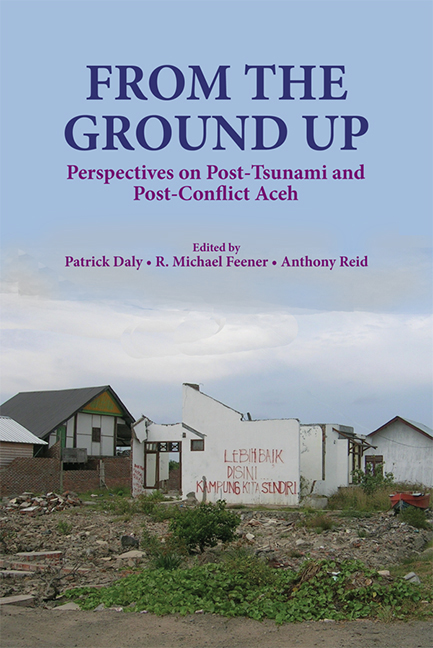Introduction: Unpacking the Challenges of Post-2004 Aceh
Published online by Cambridge University Press: 21 October 2015
Summary
How can we achieve post-disaster reconstruction and development that both rebuilds and protects people from potential loss in future catastrophes? How can we nurture a peace that assuages previous grievances and reduces the possibilities for renewed hostilities between parties with a long history of antagonism? These have been two of the main challenges facing Aceh following the 2004 Indian Ocean tsunami and the 2005 Helsinki Peace Accords that ended hostilities between the Gerakan Aceh Merdeka (GAM — Free Aceh Movement) and the Indonesian Government. Such questions are clearly important to the people of Aceh, who have experienced decades of conflict and isolation, the sudden devastation of the tsunami, and the painful and drawn-out process of mourning and rebuilding. The future of Aceh has been dramatically transformed by events since December 2004, and it will take years, if not decades, for things to stabilize.
The above questions are of immense importance to the wider international community. The experiences of Aceh will undoubtedly influence the texture and outcome of both future post-disaster responses and peace processes around the world. A large cadre of humanitarian aid workers, people involved in conflict resolution, and reconstruction and development advisers have already begun to bring their experiences from Aceh with them to their next posting or assignment. A whole generation of NGO staff, policy-makers and academics has been influenced by what happened around the Indian Ocean in the wake of the tsunami. The efforts in Aceh — both conflict and tsunami related — are extensively well documented and relatively transparent, opening possibilities for the kind of in-depth research and appraisal that are often not possible in the aftermath of large-scale trauma. The sheer amount of resources that was poured into the region to deal with the conflict and rebuild the shattered lives of victims of war and disaster warrants — indeed obligates — a comprehensive reflection in which previous standards are questioned and new knowledge generated.
This new knowledge should not be restricted to merely practical “lessons learned” or generic solutions that can be automatically applied during the next major crisis.
- Type
- Chapter
- Information
- From the Ground UpPerspectives on Post-Tsunami and Post-Conflict Aceh, pp. xxiii - xxxiPublisher: ISEAS–Yusof Ishak InstitutePrint publication year: 2012



